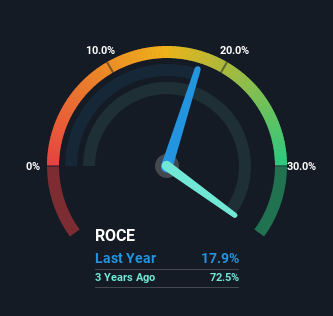Capital Allocation Trends At Chemcon Speciality Chemicals (NSE:CHEMCON) Aren't Ideal

If you're not sure where to start when looking for the next multi-bagger, there are a few key trends you should keep an eye out for. Firstly, we'd want to identify a growing return on capital employed (ROCE) and then alongside that, an ever-increasing base of capital employed. This shows us that it's a compounding machine, able to continually reinvest its earnings back into the business and generate higher returns. In light of that, when we looked at Chemcon Speciality Chemicals (NSE:CHEMCON) and its ROCE trend, we weren't exactly thrilled.
Understanding Return On Capital Employed (ROCE)
For those that aren't sure what ROCE is, it measures the amount of pre-tax profits a company can generate from the capital employed in its business. The formula for this calculation on Chemcon Speciality Chemicals is:
Return on Capital Employed = Earnings Before Interest and Tax (EBIT) ÷ (Total Assets - Current Liabilities)
0.18 = ₹691m ÷ (₹4.8b - ₹975m) (Based on the trailing twelve months to December 2021).
Therefore, Chemcon Speciality Chemicals has an ROCE of 18%. By itself that's a normal return on capital and it's in line with the industry's average returns of 18%.
See our latest analysis for Chemcon Speciality Chemicals

Above you can see how the current ROCE for Chemcon Speciality Chemicals compares to its prior returns on capital, but there's only so much you can tell from the past. If you're interested, you can view the analysts predictions in our free report on analyst forecasts for the company.
What The Trend Of ROCE Can Tell Us
When we looked at the ROCE trend at Chemcon Speciality Chemicals, we didn't gain much confidence. Over the last five years, returns on capital have decreased to 18% from 23% five years ago. On the other hand, the company has been employing more capital without a corresponding improvement in sales in the last year, which could suggest these investments are longer term plays. It may take some time before the company starts to see any change in earnings from these investments.
On a side note, Chemcon Speciality Chemicals has done well to pay down its current liabilities to 20% of total assets. So we could link some of this to the decrease in ROCE. Effectively this means their suppliers or short-term creditors are funding less of the business, which reduces some elements of risk. Since the business is basically funding more of its operations with it's own money, you could argue this has made the business less efficient at generating ROCE.
The Bottom Line On Chemcon Speciality Chemicals' ROCE
Bringing it all together, while we're somewhat encouraged by Chemcon Speciality Chemicals' reinvestment in its own business, we're aware that returns are shrinking. Since the stock has declined 23% over the last year, investors may not be too optimistic on this trend improving either. All in all, the inherent trends aren't typical of multi-baggers, so if that's what you're after, we think you might have more luck elsewhere.
If you're still interested in Chemcon Speciality Chemicals it's worth checking out our FREE intrinsic value approximation to see if it's trading at an attractive price in other respects.
While Chemcon Speciality Chemicals may not currently earn the highest returns, we've compiled a list of companies that currently earn more than 25% return on equity. Check out this free list here.
If you're looking to trade Chemcon Speciality Chemicals, open an account with the lowest-cost platform trusted by professionals, Interactive Brokers.
With clients in over 200 countries and territories, and access to 160 markets, IBKR lets you trade stocks, options, futures, forex, bonds and funds from a single integrated account.
Enjoy no hidden fees, no account minimums, and FX conversion rates as low as 0.03%, far better than what most brokers offer.
Sponsored ContentNew: AI Stock Screener & Alerts
Our new AI Stock Screener scans the market every day to uncover opportunities.
• Dividend Powerhouses (3%+ Yield)
• Undervalued Small Caps with Insider Buying
• High growth Tech and AI Companies
Or build your own from over 50 metrics.
Have feedback on this article? Concerned about the content? Get in touch with us directly. Alternatively, email editorial-team (at) simplywallst.com.
This article by Simply Wall St is general in nature. We provide commentary based on historical data and analyst forecasts only using an unbiased methodology and our articles are not intended to be financial advice. It does not constitute a recommendation to buy or sell any stock, and does not take account of your objectives, or your financial situation. We aim to bring you long-term focused analysis driven by fundamental data. Note that our analysis may not factor in the latest price-sensitive company announcements or qualitative material. Simply Wall St has no position in any stocks mentioned.
About NSEI:CHEMCON
Chemcon Speciality Chemicals
Engages in the manufacture and sale of speciality chemicals for pharmaceutical, agro-chemical, and engineering and oilfield chemicals industries in India and internationally.
Flawless balance sheet with proven track record.
Similar Companies
Market Insights
Community Narratives




